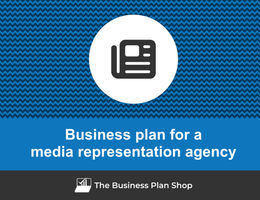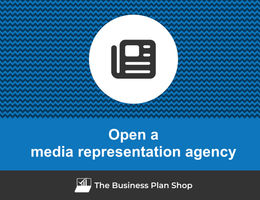How to create a financial forecast for a media representation agency?
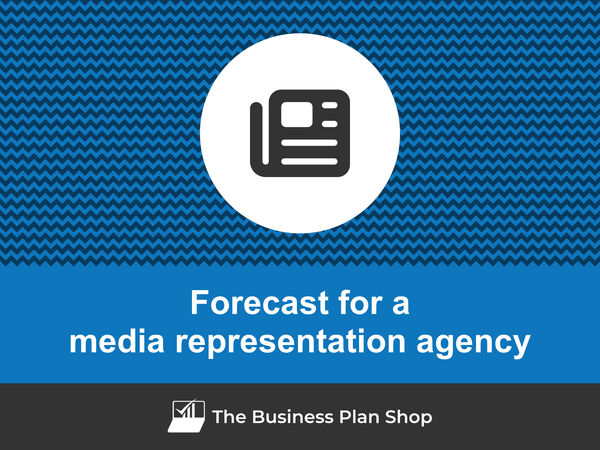
If you are serious about keeping visibility on your future cash flows, then you need to build and maintain a financial forecast for your media representation agency.
Putting together a media representation agency financial forecast may sound complex, but don’t worry, with the right tool, it’s easier than it looks, and The Business Plan Shop is here to guide you.
In this practical guide, we'll cover everything you need to know about building financial projections for your media representation agency.
We will start by looking at why they are key, what information is needed, what a forecast looks like once completed, and what solutions you can use to create yours.
Let's dive in!
Why create and maintain a financial forecast for a media representation agency?
Creating and maintaining an up-to-date financial forecast is the only way to steer the development of your media representation agency and ensure that it can be financially viable in the years to come.
A financial plan for a media representation agency enables you to look at your business in detail - from income to operating costs and investments - to evaluate its expected profitability and future cash flows.
This gives you the visibility needed to plan future investments and expansion with confidence.
And, when your trading environment gets tougher, having an up to date media representation agency forecast enables you to detect potential upcoming financing shortfalls in advance, enabling you to make adjustments or secure financing before you run out of cash.
It’s also important to remember that your media representation agency's financial forecast will be essential when looking for financing. You can be 100% certain that banks and investors will ask to see your numbers, so make sure they’re set out accurately and attractively.
Need a convincing business plan?
The Business Plan Shop makes it easy to create a financial forecast to assess the potential profitability of your projects, and write a business plan that’ll wow investors.

What information is used as input to build a media representation agency financial forecast?
A media representation agency's financial forecast needs to be built on the right foundation: your assumptions.
The data required to create your assumptions will depend on whether you are a new or existing media representation agency.
If you are creating (or updating) the forecast of an existing media representation agency, then your main inputs will be historical accounting data and operating metrics, and your team’s view on what to expect for the next three to five years.
If you are building financial projections for a new media representation agency startup, you will need to rely on market research to form your go-to-market strategy and derive your sales forecast.
For a new venture, you will also need an itemised list of resources needed for the media representation agency to operate, along with a list of equipment required to launch the venture (more on that below).
Now that you understand what is needed, let’s have a look at what elements will make up your media representation agency's financial forecast.
The sales forecast for a media representation agency
From experience, it usually makes sense to start your media representation agency's financial projection with the revenues forecast.
The inputs used to forecast your sales will include the historical trading data of your media representation agency (which can be used as a starting point for existing businesses) and the data collected in your market research (which both new ventures and existing businesses need to project their sales forward).
Your media representation agency's sales forecast can be broken down into two key estimates:
- The average price
- The number of monthly transactions
To assess these variables accurately, you will need to consider the following factors:
- Changes in media consumption habits - As technology continues to evolve, the way people consume media is also changing. Your sales forecast should consider how this may affect the average price or number of monthly transactions for your agency. For example, the rise of streaming services may lead to a decrease in traditional TV advertising and an increase in digital advertising.
- Economic conditions - The state of the economy can greatly influence the demand for media representation services. During times of economic downturn, companies may cut their advertising budgets, resulting in a decrease in your agency's average price or number of monthly transactions. On the other hand, a strong economy may lead to an increase in demand for advertising and media representation services.
- Changes in consumer behavior - As consumers become more conscious of the media they consume, they may start to gravitate towards certain types of content or platforms. This can impact the effectiveness of certain advertising strategies and ultimately affect your agency's average price or number of monthly transactions. For instance, if your agency specializes in print advertising, a shift towards digital media consumption may result in a decrease in demand for your services.
- Industry trends and competition - It's important to keep an eye on industry trends and your competition when creating a sales forecast. New technologies or emerging competitors may disrupt the market and affect your agency's average price or number of monthly transactions. Stay informed and be prepared to adapt your strategies to stay competitive.
- Changes in regulations - Changes in regulations or laws can also impact the media representation industry. For example, stricter privacy laws may limit the use of consumer data for targeted advertising, leading to a decrease in demand for certain services. It's important to monitor any potential changes and adjust your forecast accordingly.
Once you have a sales forecast in place, the next step will be to work on your overhead budget. Let’s have a look at that now.
Need a convincing business plan?
The Business Plan Shop makes it easy to create a financial forecast to assess the potential profitability of your projects, and write a business plan that’ll wow investors.

The operating expenses for a media representation agency
Once you know what level of sales you can expect, you can start budgeting the expenses required to operate your media representation agency on a daily basis.
Expenses normally vary based on how much revenue you anticipate (which is why, from experience, it is always better to start your forecast with the topline projection), and where your business is based.
Operating expenses for a media representation agency will include some of the following items:
- Staff Costs: This includes salaries, wages, and benefits for your employees who handle client accounts, sales, marketing, and administrative tasks.
- Accountancy Fees: You will need to hire an accountant or accounting firm to handle your financial records, tax filings, and other financial matters.
- Insurance Costs: As a media representation agency, you will need to have insurance to protect your business in case of any liabilities or damages.
- Software Licenses: Your agency will need to invest in software for client management, accounting, and other essential tasks.
- Banking Fees: You will need to pay for banking services such as wire transfers, check deposits, and monthly fees for maintaining your business bank account.
- Marketing and Advertising: To promote your agency and attract new clients, you will need to budget for marketing and advertising expenses, such as online ads, print materials, and events.
- Office Rent: Your agency will need a physical space to operate from, so you will need to factor in the cost of rent or lease for your office.
- Utilities: This includes expenses for electricity, water, internet, and other utilities necessary to keep your office running.
- Travel Expenses: If your agency handles clients from different locations, you may have to travel for meetings and events, so budget for transportation, accommodation, and other related expenses.
- Professional Development: To stay up-to-date with industry trends and skills, you may need to budget for training, conferences, and workshops.
- Legal Fees: You may need to consult a lawyer for contract reviews, copyright issues, and other legal matters related to your agency.
- Office Supplies: This includes expenses for stationery, printer ink, and other office supplies needed to keep your office running.
- Client Entertainment: As a media representation agency, you may have to entertain clients to build and maintain relationships, so budget for expenses related to client dinners, events, and gifts.
- Office Maintenance: You will need to maintain a clean and functional office, so budget for expenses related to office cleaning, repairs, and maintenance.
- Telecommunications: This includes expenses for phone lines, internet, and other communication services necessary for your agency's operations.
This list will need to be tailored to the specificities of your media representation agency, but should offer a good starting point for your budget.
What investments are needed to start or grow a media representation agency?
Creating and expanding a media representation agency also requires investments which you need to factor into your financial forecast.
Capital expenditures and initial working capital items for a media representation agency could include elements such as:
- Office Equipment: This includes items such as computers, printers, scanners, and other necessary equipment for day-to-day operations. These items are essential for your media representation agency to function properly and efficiently.
- Furniture: This includes desks, chairs, and other office furniture. It is important to have a comfortable and functional workspace for your employees to work in. Plus, having a well-designed office can make a good impression on potential clients.
- Software and Technology: In today's digital age, having the right software and technology is crucial for a media representation agency. This can include subscription fees for media monitoring software, graphic design programs, and video editing software.
- Professional Services: This can include hiring a lawyer to draft contracts, a consultant to help with business strategies, or an accountant to manage your finances. These services may be needed at various times throughout the year and should be budgeted for in your expenditure forecast.
- Office Space: Whether you are leasing or purchasing office space, this is a significant capital expenditure for your media representation agency. Be sure to include rent or mortgage payments, as well as any necessary renovations or repairs to the office space.
Again, this list is not exhaustive and will need to be adjusted according to the circumstances of your media representation agency.
Need a convincing business plan?
The Business Plan Shop makes it easy to create a financial forecast to assess the potential profitability of your projects, and write a business plan that’ll wow investors.

The financing plan of your media representation agency
The next step in the creation of your financial forecast for your media representation agency is to think about how you might finance your business.
You will have to assess how much capital will come from shareholders (equity) and how much can be secured through banks.
Bank loans will have to be modelled so that you can separate the interest expenses from the repayments of principal, and include all this data in your forecast.
Issuing share capital and obtaining a bank loan are two of the most common ways that entrepreneurs finance their businesses.
What tables compose the financial plan for a media representation agency?
Now let's have a look at the main output tables of your media representation agency's financial forecast.
The forecasted profit & loss statement
The profit & loss forecast gives you a clear picture of your business’ expected growth over the first three to five years, and whether it’s likely to be profitable or not.
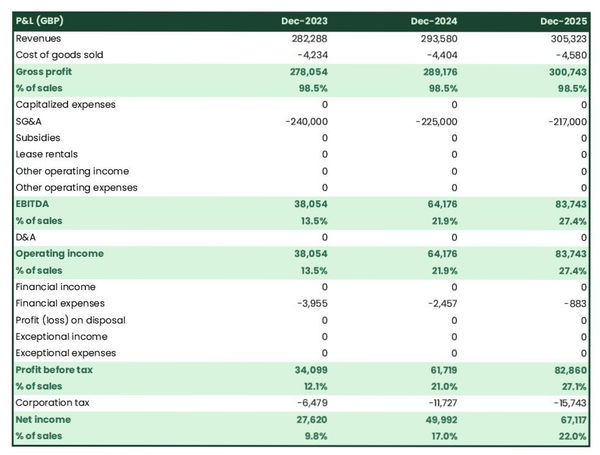
A healthy media representation agency's P&L statement should show:
- Sales growing at (minimum) or above (better) inflation
- Stable (minimum) or expanding (better) profit margins
- A healthy level of net profitability
This will of course depend on the stage of your business: numbers for an established media representation agency will look different than for a startup.
The projected balance sheet
Your media representation agency's projected balance sheet provides a snapshot of your business’s financial position at year-end.
It is composed of three types of elements: assets, liabilities and equity:
- Assets: represent what the business possesses including cash, equipment, and accounts receivable (money owed by clients).
- Liabilities: represent funds advanced to the business by lenders and other creditors. They include accounts payable (money owed to suppliers), taxes payable and loans from banks and financial institutions.
- Equity: is the combination of what has been invested by the business owners and the cumulative profits and losses generated by the business to date (which are called retained earnings). Equity is a proxy for the value of the owner's stake in the business.
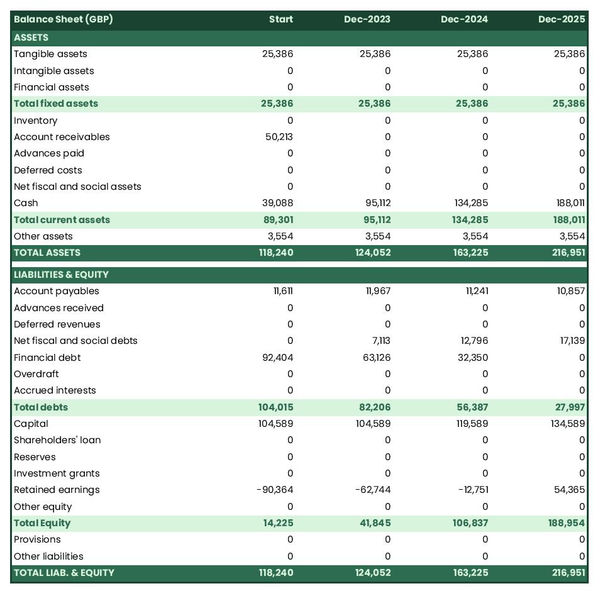
The cash flow projection
The cash flow forecast of your media representation agency will show how much cash the business is expected to generate or consume over the next three to five years.
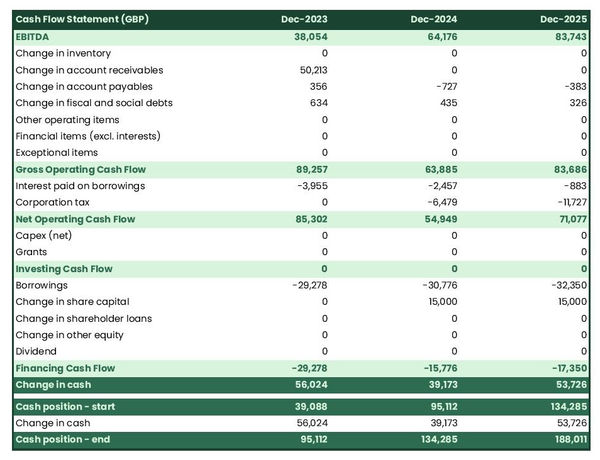
There are multiple ways of presenting a cash flow forecast but from experience, it is better to organise it by nature in order to clearly show these elements:
- Operating cash flow: how much cash is generated by the media representation agency's operations
- Investing cash flow: what is the business investing to expand or maintain its equipment
- Financing cash flow: is the business raising additional funds or repaying financiers (debt repayment, dividends)
Your cash flow forecast is the most important element of your overall financial projection and that’s where you should focus your attention to ensure that your media representation agency is adequately funded.
Note: if you are preparing a financial forecast in order to try to secure funding, you will need to include both a yearly and monthly cash flow forecast in your media representation agency's financial plan.
Need a convincing business plan?
The Business Plan Shop makes it easy to create a financial forecast to assess the potential profitability of your projects, and write a business plan that’ll wow investors.

Which tool should you use to create your media representation agency's financial forecast?
Creating your media representation agency's financial forecast may sound fairly daunting, but the good news is that there are several ways to go about it.
Using online financial projection software to build your media representation agency's forecast
The modern and easiest way to build a forecast is to use professional financial projection software such as the one we offer at The Business Plan Shop.
There are several advantages to using specialised software:
- You can easily create your financial forecast by letting the software take care of the financial calculations for you without errors
- You have access to complete financial forecast templates
- You get a complete financial forecast ready to be sent to your bank or investors
- You can easily track your actual financial performance against your financial forecast, and recalibrate your forecast as the year goes by
- You can create scenarios to stress test your forecast's main assumptions
- You can easily update your forecast as time goes by to maintain visibility on future cash flows
- You have a friendly support team on standby to assist you when you are stuck
- It’s cost-efficient and much cheaper than using an accountant or consultant (see below)
If you are interested in this type of solution, you can try our forecasting software for free by signing up here.
Calling in a financial consultant or chartered accountant
Enlisting the help of a consultant or accountant is also a good way to obtain a professional media representation agency financial forecast.
The downside of this solution is its cost. From experience, obtaining a simple financial forecast over three years (including a balance sheet, income statement, and cash flow statement) is likely to cost a minimum of £700 or $1,000.
The indicative cost above, is for a small business, and a forecast is done as a one-shot exercise. Using a consultant or accountant to track your actuals vs. forecast and to keep your financial projections up to date on a monthly or quarterly basis will cost a lot more.
If you opt for this solution, make sure your accountant has in-depth knowledge of your industry, so that they may challenge your figures and offer insights (as opposed to just taking your assumptions at face value to create the forecast).
Why not use a spreadsheet such as Excel or Google Sheets to build your media representation agency's financial forecast?
Creating an accurate and error-free media representation agency financial forecast on Excel (or any spreadsheet) is very technical and requires both a strong grasp of accounting principles and solid skills in financial modelling.
Most entrepreneurs lack the expertise required to create an accurate financial forecast using spreadsheet software like Excel or Google Sheets. As a result, it is unlikely anyone will trust your numbers.
The second reason is that it is inefficient. Building forecasts on spreadsheets was the only option in the 1990s and early 2000s, nowadays technology has advanced and software can do it much faster and much more accurately.
This is why professional forecasters all use software. With the rise of AI, software is also becoming smarter at helping us detect mistakes in our forecasts and helping us analyse the numbers to make better decisions.
Finally, like everything with spreadsheets, tracking actuals vs. forecasts and updating your forecast as the year progresses is manual, tedious, error-prone, and time-consuming. Whereas financial forecasting software like The Business Plan Shop is built for this.
Need a convincing business plan?
The Business Plan Shop makes it easy to create a financial forecast to assess the potential profitability of your projects, and write a business plan that’ll wow investors.

Use our financial forecast templates for inspiration
The Business Plan Shop has dozens of financial forecast examples available.
Our templates contain both a financial forecast and a written business plan which presents, in detail, the company, the team, the strategy, and the medium-term objectives.
Our templates are a great source of inspiration, whether you just want to see what a complete business plan looks like, or are looking for concrete examples of how you should model financial elements in your own forecast.
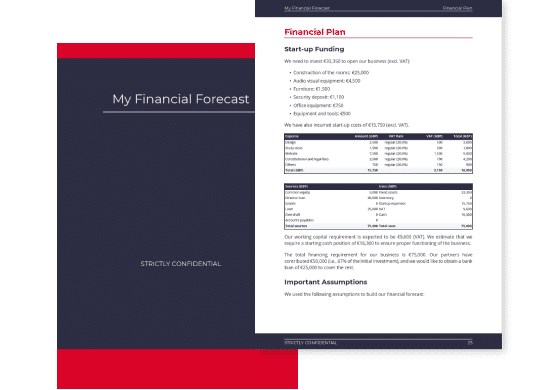
Takeaways
- A financial projection shows expected growth, profitability, and cash generation for your business over the next three to five years.
- Tracking actuals vs. forecast and keeping your financial forecast up-to-date is the only way to maintain visibility on future cash flows.
- Using financial forecasting software makes it easy to create and maintain up-to-date projections for your media representation agency.
You have reached the end of our guide. We hope you now have a better understanding of how to create a financial forecast for a media representation agency. Don't hesitate to contact our team if you have any questions or want to share your experience building forecasts!
Need a convincing business plan?
The Business Plan Shop makes it easy to create a financial forecast to assess the potential profitability of your projects, and write a business plan that’ll wow investors.

Also on The Business Plan Shop
- Example of financial projections
- How to project revenues for a business?
- Example of financial forecast for business idea
Know someone who runs or wants to start a media representation agency? Share our financial projection guide with them!


